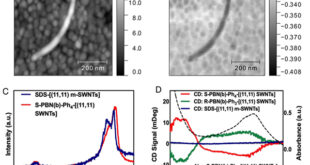F. Kermanpour, T. Sharifi
Thermochimica Acta, Volume 527, January 2012
Abstract
Densities, ρ, and viscosities, η, of pure 1-hexyl-3-methylimidazoliumtetrafluoro borate ([C6mim][BF4]) and 1-propanol, and their binary mixture {x1[C6mim][BF4] + x21-propanol} were measured at atmospheric pressure and in the temperature range of 293.15–333.15 K. The excess molar volumes, ![]() , thermal expansion coefficients, α, and their excess values, αE, isothermal coefficient of excess molar enthalpy,
, thermal expansion coefficients, α, and their excess values, αE, isothermal coefficient of excess molar enthalpy, ![]() and excess viscosities, ηE, were calculated from the experimental values of densities and viscosities. The excess molar volumes of the binary mixture are negative over the entire mole fraction range and increase with increasing temperature. Excess viscosities are negative over the entire mole fraction range of the mixture and decrease with increasing temperature. The obtained excess molar volumes and excess viscosities were correlated with the Redlich–Kister equation. The experimental results have also been used to examine the applicability of Prigogine–Flory–Patterson (PFP) theory in predicting the excess molar volume of the binary mixture. It is indicated that agreement between excess molar volumes calculated via PFP theory and the experimental results is good in all temperatures.
and excess viscosities, ηE, were calculated from the experimental values of densities and viscosities. The excess molar volumes of the binary mixture are negative over the entire mole fraction range and increase with increasing temperature. Excess viscosities are negative over the entire mole fraction range of the mixture and decrease with increasing temperature. The obtained excess molar volumes and excess viscosities were correlated with the Redlich–Kister equation. The experimental results have also been used to examine the applicability of Prigogine–Flory–Patterson (PFP) theory in predicting the excess molar volume of the binary mixture. It is indicated that agreement between excess molar volumes calculated via PFP theory and the experimental results is good in all temperatures.
Go to Journal
 Advances in Engineering Advances in Engineering features breaking research judged by Advances in Engineering advisory team to be of key importance in the Engineering field. Papers are selected from over 10,000 published each week from most peer reviewed journals.
Advances in Engineering Advances in Engineering features breaking research judged by Advances in Engineering advisory team to be of key importance in the Engineering field. Papers are selected from over 10,000 published each week from most peer reviewed journals.

